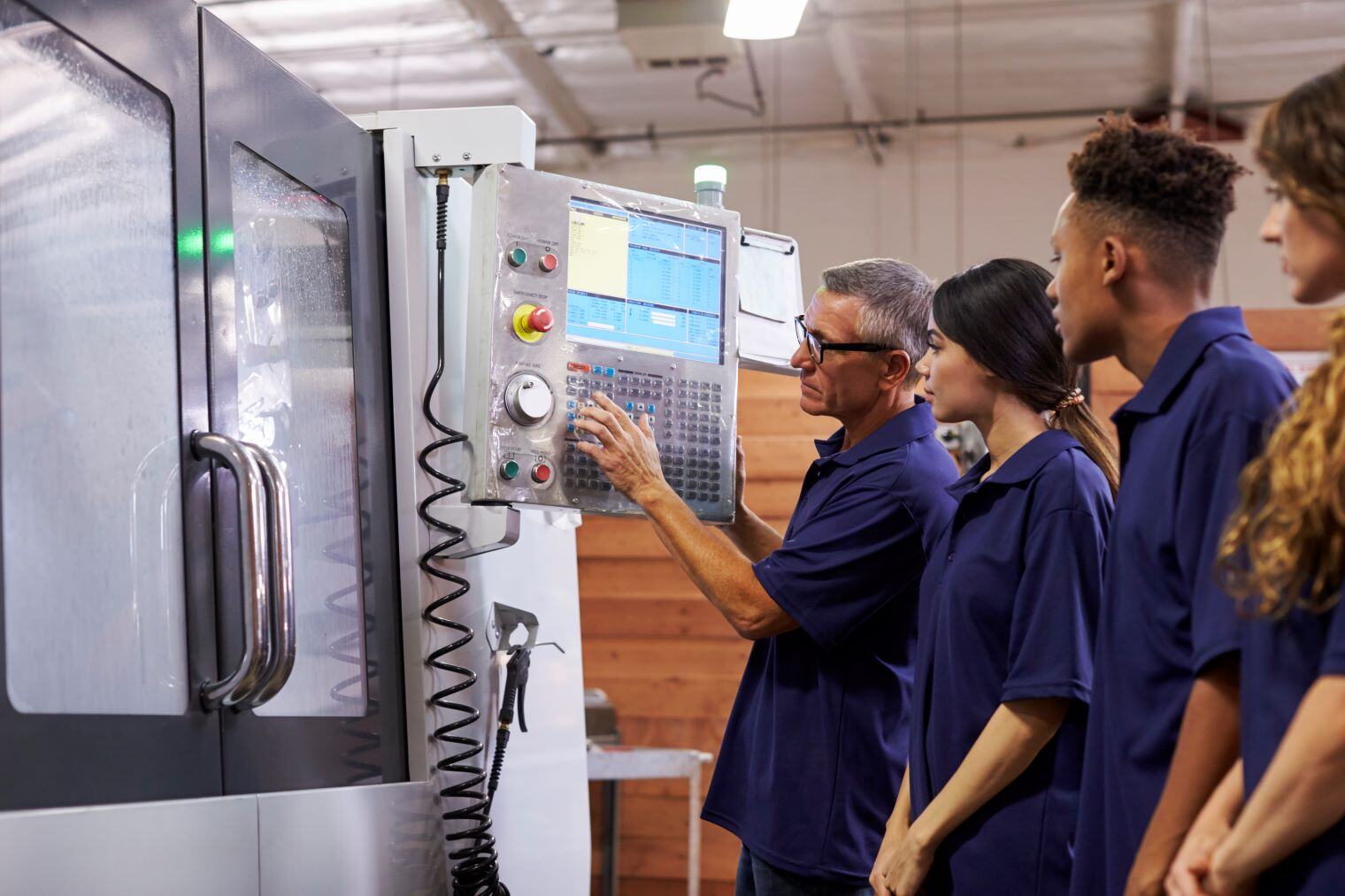What Does a Millwright Do? A comprehensive guide

Post Categories
Timpl Marketing
If you've ever wondered who is responsible for the installation, maintenance, and repair of the heavy machinery that powers the manufacturing, energy, and construction industries, the answer is likely a millwright. This blog will break down everything you need to know about this in-demand job, helping you make a more informed career choice.
What's you'll learn:
- What does a Millwright do?
- How much do they earn?
- Top highest-paying industries
- Top highest-paying states
- Top highest-employment states
- Top highest employment industries
- Education requirements
- Top certifications to advance your career as a Millwright
- What is the future ahead for Millwright?
What does a Millwright do?
Millwrights are all about precision. They use specialized instruments to ensure machinery is perfectly aligned and balanced, which is especially important in industries where even small misalignments can cause big issues. Here’s a closer look at their key responsibilities:
Installation: Millwrights install heavy machinery by reading blueprints, aligning components, and ensuring everything operates smoothly.
Maintenance: They perform regular inspections and preventive maintenance to avoid costly breakdowns.
Repair: When machinery fails, millwrights diagnose, repair, and get it running again.
Upgrading and Modifying: They update machinery to improve performance and safety as technology advances.
How much does a Millwright make?
Millwrights in Georgia earn an average salary of $59,040 annually. For those just starting or in lower-paying positions, the bottom 10% make $42,810 or less. On the higher end, the top 10% of millwrights in Georgia bring in $73,070 or more each year. (US Bureau Statistics)
Nationwide, the average salary for millwrights is slightly higher at $62,980 per year. Across the country, the lowest 10% of earners make $43,160 or less, while the top 10% enjoy salaries of $82,700 or more.
Top highest-paying industries
Here are top 5 highest-paying industries for millwrights based on annual average wage:
- Scientific Research and Development Services - $82,530
- Support Activities for Mining - $82,070
- Utility System Construction - $80,670
- Remediation and Other Waste Management Services - $79,700
- Chemical Manufacturing - $78,750
Top highest-paying states
Here are five top-paying states for millwrights based on average annual wage:
- Massachusetts - $78,540
- Washington - $76,960
- New Jersey - $74,300
- Oregon - $73,450
- Michigan - $73,220
Millwrights in these top-paying states enjoy higher wages thanks to a combination of strong demand, the cost of living, and the presence of key industries. In Massachusetts, competitive pay aligns with the state's high cost of living and industrial strength. Washington's thriving manufacturing and aerospace sectors drive up demand and salaries, while New Jersey benefits from its proximity to major industrial hubs. Oregon and Michigan, both with significant manufacturing sectors—especially in automotive and heavy machinery—offer attractive wages to draw in and retain skilled millwrights.
Top highest employment states
Here are the states with the highest employment for millwrights, along with their annual mean wages:
- Michigan - 2,760 millwrights, $73,220
- Texas - 2,500 millwrights, $62,250
- Illinois - 2,380 millwrights, $69,450
- Georgia - 2,300 millwrights, $57,700
- Alabama - 2,230 millwrights, $57,010
Top highest employment industries
Here are the industries with the highest employment for millwrights, along with their annual mean wages:
Building Equipment Contractors - 7,990 millwrights, $64,930
Nonresidential Building Construction - 4,840 millwrights, $64,290
Commercial and Industrial Machinery and Equipment Repair and Maintenance - 2,700 millwrights, $64,000
Sawmills and Wood Preservation - 2,410 millwrights, $58,720
Motor Vehicle Manufacturing - 1,670 millwrights, $78,370
How to become a Millwright in the US?
If you are considering becoming a millwright, these main steps are the common path:
Obtain a High School Diploma or GED: Most employers require a high school education as the bare minimum to begin a career as a millwright. Courses in math, physics, and technical drawing can be particularly beneficial.
Complete an Apprenticeship: A formal apprenticeship program typically lasts 3-4 years. During this time, you’ll receive a combination of classroom instruction and on-the-job training. Apprenticeships are usually sponsored by unions, trade associations, or employers.
Gain Experience: After completing an apprenticeship, you should start looking for jobs, as gaining experience in the field is crucial. Entry-level positions will allow you to develop your skills and become proficient in the tasks that millwrights perform.
Consider Formal Education: While not always required, some millwrights choose to pursue an associate degree in industrial maintenance or a related field. This can provide a deeper understanding of the technical aspects of the job and may open up more advanced career opportunities.
Certifications Recommended to Advance Your Millwright Career
These certifications not only validate your skills and expertise but also open up opportunities for higher-paying roles, increased job security, and career advancement:
- Certified Maintenance & Reliability Technician (CMRT): Offered by the Society for Maintenance & Reliability Professionals (SMRP), this certification demonstrates your expertise in maintenance and reliability practices, which can be valuable for career advancement.
- Journeyman Millwright Certification: Various states or regions offer journeyman certifications, which often require passing an exam and having a certain amount of work experience. This certification can validate your skills and enhance your job prospects.
- Certified Automation Professional (CAP): Provided by the International Society of Automation (ISA), this certification focuses on automation systems and controls, which are increasingly relevant in modern millwright roles.
- Forklift Operator Certification: This certification ensures you are qualified to operate forklifts and other heavy machinery, a common requirement for millwrights.
- National Institute for the Certification of Engineering Technologies (NICET) Certification: NICET offers various certifications in fields related to engineering technology, including industrial maintenance. Achieving this certification can demonstrate your technical expertise.
- OSHA Safety Certification: Safety certifications from the Occupational Safety and Health Administration (OSHA) can be beneficial, as they ensure you are knowledgeable about workplace safety standards and practices.
- Certified Professional in Supply Management (CPSM): Offered by the Institute for Supply Management (ISM), this certification can be useful if your millwright role involves significant supply chain or procurement responsibilities.
How to find a job as a Millwright?
Although these tips are not specific to millwrights or any particular job, they are still helpful and provide a good idea of how to find the job you want.
1. How to find a job in Cartersville, GA
2. How to find a job in Manteca, CA
3. How to find a job in LaGrange, GA
Next, let’s explore what interview questions are recommended, How to follow a job after interview, How to negotiate after a job offer to help you succed.
What's future ahead for Millwrights?
Even with all the exciting advancements in technology, like automation, there's no need to worry about job security as a millwright. In fact, these changes create more opportunities for skilled professionals. As industries grow and machinery gets more advanced, the need for millwrights who can handle, repair, and install these complex systems is increasing.
According to the U.S. Bureau of Statistics, millwrights can expect a steady 3% growth in job opportunities from 2022 to 2032. That means around 3,500 new job openings each year over the next decade. So, if you're considering a career as a millwright, the future looks bright and full of possibilities.
Looking for your next job as a Millwright? Explore your possibilities with Timpl.


